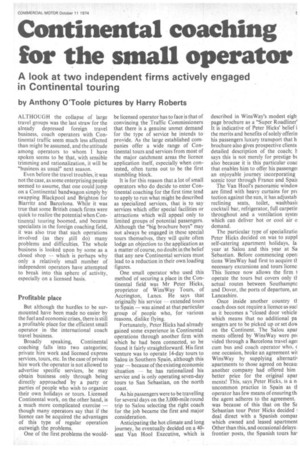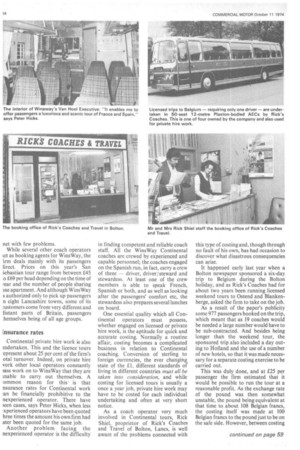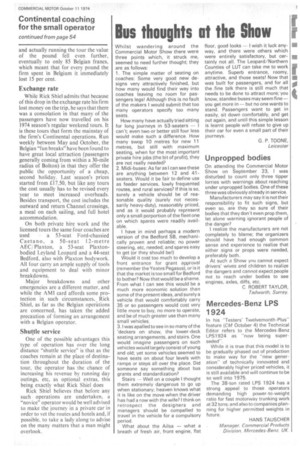Continental coaching for the small operator
Page 55

Page 56

Page 61

If you've noticed an error in this article please click here to report it so we can fix it.
A look at two independent firms actively engaged in Continental touring
by Anthony O'Toole pictures by Harry Roberts
ALTHOUGH the collapse of large travel groups was the last straw for the already depressed foreign travel business, coach operators with Continental traffic seem much less affected than might be assumed, and the attitude among operators to whom I have spoken seems to be that, with sensible trimming and rationalization, it will be "business as usual" next season.
Even before the travel troubles, it was not the case, as some enterprising people seemed to assume, that one could jump on a Continental bandwagon simply by swapping Blackpool and Brighton for Biarritz and Barcelona. While it was true that some British coach firms were quick to realize the potential when Continental touring boomed, and became specialists in the foreign coaching field, it was also true that such operations involved (as they still do) many problems and difficulties. The whole business is looked upon by some as a closed shop — which is perhaps why only a relatively small number of independent operators have attempted to break into this sphere of activity, especially on a licensed basis,
Profitable place
But although the hurdles to be surmounted have been made no easier by the fuel and economic crises, there is still a profitable place for the efficient small operator in the international coach travel business.
Broadly speaking, Continental coaching falls into two categories; private hire work and licensed express services, tours, etc. In the case of private hire work the operator is not allowed to advertise specific services, he may obtain business only through being directly approached by a party or parties of people who wish to organize their own holidays or tours. Licensed Continental work, on the other hand, is a much more complicated exercise — though many operators say that if the licence can be acquired the advantages of this type of regular operation outweigh the problems.
One of the first problems the would be licensed operator has to face is that of convincing the Traffic Commissioners that there is a genuine unmet demand for the type of service he intends to provide. As the large established companies offer a wide range of Continental tours and services from most of the major catchment areas the licence application itself, especially when contested, often turns out to be the first stumbling block.
It is for this reason that a lot of small operators who do decide to enter Continental coaching for the first time tend to apply to run what might be described as specialized services, that is to say services which offer special facilities or attractions which will appeal only to limited groups of potential passengers. Although the "big brochure boys" may not always be engaged in these special tours themselves, they will quite often lodge an objection to the application as a matter of course, no doubt in the belief that any new Continental services must lead to a reduction in their own loading figures.
One small operator who used this method of securing a place in the Continental field was Mr Peter Hicks, proprietor of WinsWay Tours, of Accrington, Lancs. He says that originally his service — extended tours to Spain — was aimed at that particular group of people who, for various reasons, dislike flying.
Fortunately, Peter Hicks had already gained some experience in Continental operations through another firm with which he had been connected, so he found it fairly straightforward: His first venture was to operate I4-day tours to Salou in Southern Spain, although this year — because of the existing economic situation — he, has rationalized his service and is only operating seven-day tours to San Sebastian, on the north coast.
As his passengers were to be travelling for several days on the 3,000-mile round trip to Salou selecting the right coach for the job became the first and major consideration.
Anticipating the hot climate and long journey, he eventually decided on a 40seat Van Hool Executive, which is described in WinsWay's modest eigh. page brochure as a "Super Roadlinerl It is indicative of Peter Hicks' belief i the merits and benefits of solely offerin his passengers luxury transport that h brochure also gives prospective clients detailed description of the coach; says this is not merely for prestige bt also because it is this particular coac that enables him to offer his passengei an enjoyable journey incorporating scenic tour through France and Simi!
The Van Hoors panoramic window are fitted with heavy curtains for pr tection against the sun, it has adjustab reclining seats, toilet, washbasii cocktail bar, refrigerator, full carpetin throughout and a ventilation systei which can deliver hot or cool air o demand.
The particular type of specializatio Peter Hicks decided on was to suppl self-catering apartment holidays, la year •at Salon and this year at Sa Sebastian, Before commencing open tions WinsWay had first to acquire tF necessary excursions and tours licenc This licence now allows the firm operate the tours but covers only a actual routes between Southamptc and Dover, the ports of departure, an Lancashire.
Once inside another country ti coach does not require a licence as sue as it becomes a "closed door vehicle which means that no additional pa sengers are to be picked up or set dor\ on the Continent, The Salou apar ments offered by WinsWay were pn vided through a Barcelona travel ager cum bus and coach operator who, ( one occasion, broke an agreement wii WinsWay by supplying alternatil apartments to those agreed on becau; another company had offered him better price for the original apar merits! This, says Peter Hicks, is a tv uncommon practice in Spain as ti operator has few means of ensuring th, the agent adheres to the agreement. was because of this that on the Sr Sebastian tour Peter. Hicks decided 1 deal direct with a Spanish compar which owned and leased apartment Other than this, and occasional delays , frontier posts, the Spanish tours ha, net with few problems.
While several other coach operators ict as booking agents for WinsWay, the irm deals mainly with its passengers lirect. Prices on this year's San ;ebastian tour range from between £45 o £69 per head depending on the time of mar and the number of people sharing me apartment. And although WinsWay s authorized only to pick up passengers n eight Lancashire towns, some of its ;ustorners come from verydifferent and iistant parts of Britain, passengers .hemselves being of all age groups.
Ensurance rates
Continental private hire work is also indertaken. This and the licence tours epresent about 25 per cent of the firm's otal turnover. Indeed, on private hire vork other local operators constantly )ass work on to WinsWay that they are mable to carry out themselves. A :ommon reason for this is that nsurance rates for Continental work an be financially prohibitive to the nexperienced operator. There have ieen cases, says Peter Hicks, when less xperienced operators have been quoted hree times the amount his own firm had ater been quoted for the same job.
Another problem facing the nexperienced operator is the difficulty in finding competent and reliable coach staff. All the WinsWay Continental coaches are crewed by experienced and capable personnel; the coaches engaged on the Spanish run, in fact, carry a crew of three — driver, driver/ steward and stewardess. At least one of the crew members is able to speak French, Spanish or both, and as well as looking after the passengers' comfort etc, the stewardess also prepares several lunches on board.
One essential quality which all Continental operators must possess, whether engaged on licensed or private hire work, is the aptitude for quick and accurate costing. Normally a routine affair, costing becomes a complicated business in relation to Continental coaching. Conversion of sterling to foreign currencies, the ever changing state of the £1, different standards of' living in different countries must all be taken into consideration, and while costing for licensed tours is usually a once a year job, private hire work may have to be costed for each individual undertaking and often at very short notice.
As a coach operator very much involved in Continental tours, Rick Shiel, proprietor of Rick's Coaches and Travel of Bolton, Lanes, is well aware of the problems connected with this type of costing and, though through no fault of his own, has had occasion to discover what disastrous consequencies can arise.
It happened early last year when a Bolton newspaper sponsored a six-day trip to Belgium during the Bolton holiday, and as Rick's Coaches had for about two years been running licensed weekend tours to Ostend and Blankenberge, asked the firm to take on the job.
As a result of the paper's publicity some 977 passengers booked on the trip, which meant that as 19 coaches would be needed a large number would have to be sub-contracted. And besides being longer than the weekend tour, the sponsored trip also included a day outing to Holland and the use of a number of new hotels, so that it was made necessary for a separate costing exercise to be carried out.
This was duly done, and at £25 per passenger the firm estimated that it would be possible to run the tour at a reasonable profit. As the exchange rate of the pound was then somewhat unstable, the pound being equivalent at that time to about 108 Belgian francs, the costing itself was made at 100 Belgian francs to the pound just to be on the safe side. However, between costing
and actually running the tour the value of the pound fell even further, eventually to only 85 Belgian francs, which meant that for every pound the firm spent in Belgium it immediately lost 15 per cent.
Exchange rate
While Rick Shiel admits that because of this drop in the exchange rate his firm lost money on the trip, he says that there was a consolation in that many of the passengers have now travelled on his 1974 season's regular weekend tours. It is these tours that form the mainstay of the firm's Continental operations. Run weekly between May and October, the Belgian "fun breaks" have been found to have great local attraction (passengers generally coming from within a 30-mile radius of Bolton) in that they offer the public the opportunity of a cheap, second holiday. Last season's prices started from £17.50, but like any tours the cost usually has to be revised every year to meet increased overheads. Besides transport, the cost includes the outward and return Channel crossings, a meal on each sailing, and full hotel accommodation.
On both private hire work and the licensed tours the same four coaches are used a 53-scat Ford-chassied Caetano, a 50-seat 12-metre AEC/ Plaxton, a 53-seat Plaxtonbodied Leyland Leopard and a 44-seat Bedford, also with Plaxton bodywork. All four carry an ample supply of tools and equipment to deal with minor breakdowns.
Major breakdowns and other. emergencies are a different matter, and while the AM1 card affords some protection in such circumstances, Rick Shiel, as far as the Belgian operations are concerned, has taken the added precaution of forming an arrangement with a Belgian operator.
Shuttle service
One of the possible advantages this type of operation has over the long distance "shuttle service" is that as the coaches remain at the place of destination throughout the duration of the tour, the operator has the chance of increasing his revenue by running day outings, etc, as optional extras, this being exactly what Rick Shiel does Rick Shiel believes that before any such • operations are undertaken, a "novice" operator would be well advised to make the journey in a private car in order to vet the routes and hotels and, if possible, to take a lady along to advise on the many matters that a man might overlook.




























































































































































